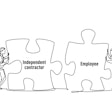It's a typical busy work day—you rush around town as you bid potential jobs, check in on your crews on the job sites, stop at your distributor and barely make it on time to an appointment with your banker. At the end of all this, you return to your office to find the dreaded certified mail envelope from your local courthouse. Inside the envelope, you find a summons and complaint from one of your frequent customers. How do you react? What should you do to protect your company? How will you manage your litigation expenses?
Don't Underestimate the Opposition
Your initial reaction to the lawsuit may be anger, surprise and disappointment. You may think the claims against your company lack merit and should be immediately dismissed because they are frivolous and made in bad faith. Managing your emotional reaction to the lawsuit, however, is extremely important.
Remember, the opposition has retained legal counsel, investigated the facts and drafted the complaint against you. You may not know all of the relevant facts, but the opposition's investment in the lawsuit is an indication that you should not take the claims lightly. Work through your initial emotional reaction and manage the litigation as a prudent, level-headed businessperson.
Call for Backup
Within the next day or two at the most, contact your insurance agent and e-mail or fax them a copy of the complaint, together with basic relevant documents, such as contracts, change orders or correspondence. Your insurance company may have a duty to defend your company and its property from the claims asserted in the lawsuit. Even before a lawsuit is filed, you should notify your lawyer and insurance agent when you become aware of a potential claim. They may be able to recommend ways to limit your vulnerability in a lawsuit.
If your insurer hires a defense lawyer, remember that the attorney works for you, not the insurance company. The attorney-client relationship is a confidential relationship requiring loyalty, good faith and honesty. It is important that you have a high level of confidence in your legal counsel.
While you are waiting for the insurance coverage determination, make sure you know the "answer date," the date by which you must respond to the complaint or a default judgment may be taken against you. It is important to act quickly so the answer date deadline is not missed.
Contact your personal lawyer as well to help you navigate through the insurance coverage issues and calculate your answer date. If insurance defense counsel is not assigned, you may need your own lawyer to handle the case.
Finally, adopt policies for handling certified mail, subpoenas and other important papers so they are not buried on someone's desk at the office. Although courts do not like to grant judgment by default, you do not want to begin the case from this disadvantaged position.
Your Best Defense is a Good Offense
Within your company, establish a "control group" of employees who need to be involved in your defense of the litigation. Notify them that the lawsuit has been filed, and instruct them not to discuss the litigation with anyone outside the control group.
Gather all documents related in any way to the claims asserted by the plaintiff. Quickly collect all written and electronic materials and organize them by issue or chronological order. Make sure all employees know that destruction of any documents, including electronic records, could lead to sanctions or adverse judgment against the company. Make a list of all sources of information available to the company, including e-mails, electronic folders, correspondence files, financial records and individual holding files separately maintained by employees.
Documents are often believed to be more reliable than witness testimony. You should think of your compilation of documents as building blocks upon which the foundation of your case will be built. Make no mistake, your company will need to invest a significant amount of time gathering and reviewing all relevant documents. Completing this arduous task as soon as possible will help educate your legal counsel and reduce legal expenses during the discovery phase of the litigation. It will also help your attorney if you prepare a timeline of key events to discuss during your initial review meeting.
Control Your Communication
Your knee-jerk reaction may be to call the plaintiff to find out why the suit was filed or to argue the merits of the case. Statements that could harm your case are sometimes made during these heated discussions. It is better to let cooler heads prevail and channel all communications through your attorney. If the opposition wished to negotiate a resolution to the dispute with you, they most likely would have attempted to do so prior to filing the complaint.
At the appropriate time, your attorney will contact opposing counsel and be able to probe the opposition about why the lawsuit was filed and question the merits of the claims. At this early stage, you and the control group can help your legal counsel by identifying all possible witnesses, but should not contact them directly at this time.
Develop a Theme
You need to have a theme that will persuade the judge and/or jury that justice requires your side to prevail. Even though you may have strong feelings concerning the theme of your case from the outset, you need to listen to your lawyers and effectively view all the facts from the case in terms of the governing laws. Principles of equity or fairness may be extremely important. Early on, make an effort to objectively analyze your case and help the defense team develop the theme that will be the centerpiece of your legal defense, settlement strategy and, if necessary, trial presentation.
It is obvious that no one wants to be the recipient of a lawsuit. More than 90 percent of lawsuits are resolved prior to trial, but simply ignoring the complaint will not make it go away. It is important to manage your emotions and respond to the lawsuit with the assistance of competent attorneys. By adopting a team approach, you can identify and compile the building blocks necessary for an effective and cost-efficient defense.
































